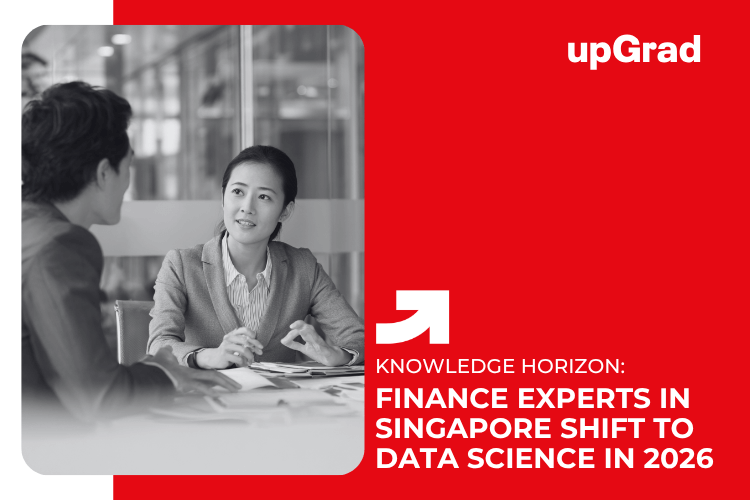Many finance professionals across Singapore are now making a smart career move — transitioning into data science. As companies increasingly depend on data-driven insights, predictive analytics, and automation, the finance world is undergoing a major transformation. Those who combine financial know-how with data science skills are discovering new ways to enhance forecasting, strengthen business strategies, and manage risks more intelligently.
What makes this transition even more appealing is the strong earning potential: data scientists in Singapore typically command annual salaries ranging from SGD 72,000 and SGD 108,000 a year.
This shift is not limited to learning new tools but also about being relevant in a dynamic digital economy. Companies now seek professionals who can combine analytical insights and financial expertise. As such, finance professionals are opting for data science courses to future-proof their careers.
This blog will discuss the prospects in data science for finance professionals in Singapore. It will also discuss the intersections where these two domains overlap.
Source: Glassdoor, as of October 29, 2025
Data Science for Finance Professionals: Why It’s Becoming a Must-Have Skill in 2026
Data science has become a crucial skill for finance professionals in Singapore, as the finance industry has become increasingly reliant on data-driven strategies for risk prediction, informed decision-making, and practical marketing analysis.
1. Rise of Data-Driven Decision Making
This is the most crucial reason behind the growing importance of data science for finance professionals. Right now, the finance sector in Singapore is seeing a significant rise in data-driven decision-making, driven by factors like:
- Enhanced Personalization and Customer Understanding
- Improved Fraud Detection and Risk Management
- More Agile Financial Strategies and Planning
- Greater Productivity and Operational Efficiency
- Artificial Intelligence (AI)-Powered Transformation
AI is now deeply integrated into the financial sector of Singapore, transforming everything from risk assessment to customer service.
However, this particular phenomenon also faces various challenges, the chief among them being data security and privacy, AI complexities, and future developments in AI technology.
2. Automation of Traditional Finance Roles
At present, automation is significantly reshaping the conventional roles in Singapore’s finance sector in the following ways:
- Automating Routine Tasks
- Cost Savings and Efficiency
- Shift to Strategy from Reporting
- Middle-Office Reduction
Automation is driving demand for hybrid and new roles that combine strategic and technical skills with financial expertise.
3. Financial Technology (FinTech) Expansion
The FinTech sector in Singapore is expanding strongly right now because of factors like strong government support, growth in key areas like:
- Tokenization and Digital Assets
- AI-Powered Solutions
- Sustainable Finance
- Embedded Finance
- Digital Lending to Small and Medium Enterprises (SMEs)
Cross-border expansion and infrastructure projects, such as Project Nexus and PayNow, are also playing a significant role in this growth. However, such growth is also facing challenges like regulatory scrutiny.
4. Advanced Risk Analytics
Singapore is the leading global hub for advanced risk analytics at present, driven by key drivers such as the following:
- Automation and AI Adoption
- Regulatory Imperatives
- Emphasis on Resilience
- Emerging Risk Areas
In the financial services industry, experts are utilizing advanced risk analytics in areas such as credit risk assessment, operational risk management, market risk analysis, and regulatory technology.
Also read: Best Free Data Science Courses Online in Singapore
5. Investment and Trading Analytics
Right now, the most prominent characteristics of trading and investment analytics in Singapore are:
- Dominance of Machine Learning and AI
- Rise of Robo-Advisors and Digital Investment
- Focus on Environment, Social, and Governance (ESG) Data Intelligence
- Distributed Ledger Technology (DLT) and Blockchain Adoption
- Regulatory Technology (RegTech) for Compliance
The strong government support from the Monetary Authority of Singapore and the impressive growth of the overall Southeast Asian market have also played essential roles in the growing importance of investment and trading analytics.

The Intersection of Finance and Data Science: How the Two Fields Converge
For individuals seeking to learn data science for finance professionals, it is essential to be aware of Smart FinTech. This data-driven financial ecosystem has emerged from the convergence of Singapore’s finance and data science industries.
The key areas of convergence here are:
- Risk Management
- Cybersecurity and Fraud Detection
- Customer Analytics and Personalization
- Portfolio Optimization and Algorithmic Trading
- Compliance and RegTech
- ESG Integration with a Focus on Sustainable Finance
The major trends driving this confluence at present are:
- Pervasive Adoption of AI
- Alternative Data Sources
- Explainable AI
- Real-Time Analytics and Cloud Computing
Also read: Power BI vs. Tableau: Which Tool Do Singapore Companies Prefer?
In-Demand Data Science Skills for Finance Professionals in 2026
An essential part of applying data science in the finance industry correctly is having the right skills, such as:
1. Technical Skills
- Programming Languages
- Statistics and Data Analytics
- AI and Machine Learning
- Big Data Technologies
2. Finance-Specific Applications
- Fraud Detection
- Risk Management
- Algorithmic Trading
- Portfolio Optimization
3. Communication and Data Handling
These skills can benefit you in various ways as a finance professional working in the data science sector in Singapore. For example, if you are proficient in programming languages like R and Python, it helps you with machine learning and statistical analysis.
Also read: Top Career Opportunities in Python for Singapore Professionals in 2025-26
Career Pathways: What Roles Can Finance Professionals Move Into
By studying data science courses for finance professionals in Singapore, you can land significant job roles that pay you well, too, like:
| Job Role | Annual Salary Range |
| Quantitative Analyst | SGD 100,000 – SGD 200,000 |
| Compliance and Risk Analyst | SGD 111,000 – SGD 119,000 |
| Data Scientist | SGD 72,000 – SGD 108,000 |
| Machine Learning Engineer | SGD 72,000 – SGD 108,000 |
| Wealth Management Analyst | SGD 60,000 – SGD 108,000 |
| Financial Analyst | SGD 48,000 – SGD 72,000 |
| Data Analyst | SGD 48,000 – SGD 72,000 |
Source: Glassdoor, as of July 8, 2024, September 19, October 29, November 2, November 3, and November 5, 2025
Also read: Data Science Specializations and Majors in Singapore in 2026
Power Your Finance-to-Data-Science Transition with upGrad
The data science courses available through upGrad help you transition professionally from finance to data science. For this, they offer structured online programs with career services and expert mentorship. In these programs, you participate in real-world projects, build practical skills, and create a strong data science portfolio.
- Master of Science in Data Science, Liverpool John Moores University
- Executive Diploma in Data Science and AI, Indian Institute of Information Technology (IIIT) Bangalore
- Post Graduate Certificate in Data Science & AI, IIIT Bangalore
Must read articles:
- Why Data Visualization Is Essential in Data Analytics: Explained for Singapore Professionals
- How Data Science is Transforming Real-World Decision-Making in the US
- Predictive Analytics: Future Trends and Patterns
- Best Data Science Tools You Should Know in Singapore
- Top Companies Hiring Data Scientists in Singapore in 2025-26
🎓 Explore Our Top-Rated Courses in Singapore
Take the next step in your career with industry-relevant online courses designed for working professionals in Singapore.
- DBA Courses in Singapore
- Data Science Courses in Singapore
- MBA Courses in Singapore
- Master of Education Courses in Singapore
- AI ML Courses in Singapore
- Digital Marketing Courses in Singapore
- Product Management Courses in Singapore
- Generative AI Courses in Singapore
FAQs on Data Science After Finance
The following are the key hiring sectors for data science professionals in Singapore now:
1. IT and Technology
2. Banking and Financial Services Industry (BFSI) and FinTech
3. Biotechnology and Healthcare
4. Maritime and Logistics
5. Government
The following are the best roles for finance professionals to pursue after learning data science:
1. Quantitative Analyst
2. Compliance and Risk Analyst
3. Data Scientist
4. Machine Learning Engineer
5. Wealth Management Analyst
It typically takes between a few months and two years for a finance professional to transition into data science in Singapore.
The most important data science tools used for finance in Singapore are:
1. Python
2. R
3. Structured Query Language (SQL)
4. Power BI
5. Tableau
6. TensorFlow
7. Scikit-learn
Yes, employers in Singapore typically recognize online data science programs, especially those from reputable institutions that impart the necessary practical skills.
Sources:
- https://www.glassdoor.co.in/Salaries/singapore-singapore-data-scientist-salary-SRCH_IL.0,19_IM1123_KO20,34.htm
- https://iabac.org/blog/what-skills-are-covered-in-data-science-in-singapore#:~:text=Growing%20Tech%20Industry:%20Many%20companies,%2C%20AI%2C%20and%20data%20analysis.
- https://www.upgrad.com/sg/blog/in-demand-skills-singapore/#:~:text=Data%20analytics%20is%20one%20of,in%20high%20demand%20in%20Singapore.
- https://www.upgrad.com/sg/blog/why-take-a-data-science-course-in-singapore-heres-why-its-a-smart-choice/#:~:text=Conclusion,pursuing%20a%20data%20science%20course.
- https://www.aryza.com/news/financial-services-2025-predictions/#:~:text=AI%20and%20Automation&text=This%20will%20enable%20financial%20institutions,data%2Ddriven%20decision%2Dmaking.
- https://softjourn.com/insights/data-driven-decision-making































